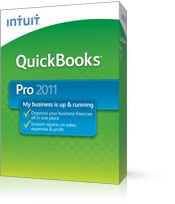
While out picking up some stuff from the super market while on vacation, I happened by a giant book sale. All the books were 80% off list, so I looked around and found six great business books I've been looking for.
When I went to check out, the lady at the front asked what I did. I told her I help people start small businesses. That lead to a lengthy conversation, but during the discourse, she made one point that stuck in my mind. She said, "One thing more small business people need to learn is accounting! Keeping up with their books, and especially receivables is one the most important things they need to do!" I agreed with a hardy YES to that!
One of my favorite programs for small business accounting is QuickBooks Pro. I like it because you can track receivables and inventory in it, but are your ready for that? There are many accounting choices available to small business people. With all the choices, it can get confusing. Just because I like QuickBooks doesn't mean it's for everyone.When I get back from vacation, I'm going to search around for some good accounting choices, but until then, here is a great article Jennifer A. Thieme, a QuickBooks Pro Advisor, wrote about this. Read over it and let me know what you think in the comments section. Also, if you are using an accounting program now, let me know what it is.
Do you need QuickBooks at this time? Are you feeling swayed by the advertisements about how easy it will make things?
QuickBooks is a full-blown double-entry accounting system. Although Intuit has done an excellent job making double-entry accounting accessible to many people, it still requires a certain amount of specialized knowledge to use the program effectively.
Brand new, solo, sole proprietors generally only need a few things in their day-to-day business accounting:
1. Accurate Bank Balances. Managing and reconciling the check register should be as easy as possible. Printing vendor checks is nice, but optional.
2. How Much Revenue? Tracking revenue for tax purposes is an absolute must.
3. Expenses Tracking. Keeping track of all expenses in their proper categories is also an absolute must for tax purposes.Quicken can do all of these things, more easily and less expensively than QuickBooks. So can Excel or even a paper based system.
I'm not a big fan of switching people over to QuickBooks unless their financial situation changes. You might be ready for QuickBooks if:
4. Employees. Perhaps you've grown to the point of needing to hire people. Great! But you also might need a new accounting system to help you with all of the payroll reporting & payment requirements.
5. Inventory. Perhaps your inventory has grown to the point where you would be better off tracking it via software. QuickBooks can help you with this.
6. Change of Entity. You may have grown to the point where you should change from a sole proprietor to some other type, such as an S-Corp. If so, then you need to be able to generate a balance sheet for tax purposes. QuickBooks can do that for you.
7. Accounts Receivable. You may send a lot of customer invoices each week or month. QuickBooks can keep track of these for you in a very organized and easy to understand way.
8. Lots of Business Debt. If you have many loan balances, keeping track of them in QuickBooks is easy.
9. Job Costing. You perform work on a job-by-job basis. Maybe it's time to track revenue and expenses for each job - this way, you can determine if you are making money on each job, and which jobs are more profitable than others. QuickBooks does this.If more than one of these applies to you, it may be time to make the switch.
Final Thoughts
Switching to QuickBooks means better reports and better tracking of financial data. For this, you may need professional help - you may need to hire somebody to do the bookkeeping and/or help with the setup. So switching accounting systems will cost more than just the price of the software. Before you switch, make sure that the additional data is worth the additional expense. If some of the above variables have come into play, it probably is.
About the Author: Jennifer A. Thieme is a Certified QuickBooks ProAdvisor who loves to help people with QuickBooks. She brings unique insight, clear instructions, and over ten years of experience to all of her QuickBooks articles. Owner of Solid Rock Accounting Services, Jennifer's clients enjoy these same benefits on a personal and regular basis. You can too - visit http://www.jenniferthieme.com and contact Jennifer today.






